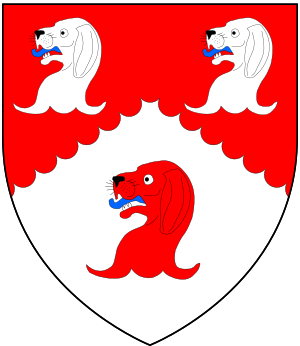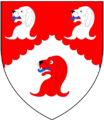Charles Duncombe (English banker) facts for kids
Sir Charles Duncombe (born November 1648 – died 9 April 1711) was a very successful English banker and politician. He lived in Teddington, Middlesex, and Barford, Wiltshire. He was a member of the English House of Commons and later the British House of Commons from 1685 until his death in 1711. He also served as the Lord Mayor of London from 1708 to 1709. Sir Charles became incredibly wealthy through his banking work, and by the time he died, he was said to be worth £400,000, making him the richest commoner in England.
Contents
Early Life and Beginnings
Charles Duncombe was born in November 1648. His father was Alexander Duncombe, and his mother was Mary Pawley. When he was about 17, in 1665, he started learning the goldsmith trade in London with a man named Edward Backwell. In 1672, he became a member of the Goldsmiths' Company, which was an important group for people in that business.
Charles got a tip from a powerful person, Lord Shaftesbury, to take a lot of money out of the government's treasury before the government stopped payments. When his boss, Edward Backwell, faced difficulties because of these payment issues, Charles took over his business location in Lombard Street. This was a big step for him.
A Successful Banker and Public Official
In 1680, Charles Duncombe was given an important job as the Cashier of excise, which meant he handled government taxes. He earned a good salary from this. He also worked as a Commissioner for the Mint, helping with the making of coins. From these roles, he earned a lot of money and helped create a new way for people to get credit. He also found ways to make extra money through government financial papers called Exchequer tallies.
He was also an alderman for a part of the City of London from 1683 to 1686. An alderman was a senior member of the city council. In 1684, he became a Commissioner for tin coinage and also the Cashier of hearth-tax. He lent a large sum of £50,000 to the King, which was a huge amount of money back then. When King James II left the country in 1688, Charles Duncombe refused to lend him more money to help him escape.
His Time in Politics
Sir Charles Duncombe started his political career in 1685 when he was elected as a Member of Parliament (MP) for Hedon. He was very active in Parliament, working on many committees. He later became an MP for Yarmouth (Isle of Wight) in 1690 and then for Downton in 1695. He was known for supporting the Tories. During this time, he was against the creation of the Bank of England. In 1694, he bought a very large estate called Helmsley, which is now known as Duncombe Park.
In 1698, Charles Duncombe faced a serious accusation related to government financial documents. He was arrested and held in the Tower of London, and then removed from Parliament. However, when he went to trial, he was found not guilty because of a mistake in the charges. After this, he was knighted in 1699, becoming "Sir Charles Duncombe." He continued to serve the City of London as an alderman and as Sheriff of London in 1700.
He continued to run for Parliament, sometimes winning and sometimes losing. In 1702, he was elected for both Hedon and Downton, choosing to represent Downton. He helped his constituents by looking into coal prices and supporting a petition for an extra market day in Downton.
In 1708, Sir Charles was again elected as MP for Downton without opposition. In September of that year, he became the Lord Mayor of London. This was a very important position. A big public celebration was planned for him, but it was canceled because Prince George of Denmark, who was Queen Anne's husband, sadly passed away the day before.
Sir Charles was known for supporting the Tory party. He also showed support for charitable causes and was praised by people who owed money and were in prison for his help when he was Mayor. He was re-elected as MP for Downton in 1710.
Death and His Family's Future
Sir Charles Duncombe passed away on 9 April 1711, in Teddington. He never married. At the time of his death, he was known as the richest commoner in England. His brother, Anthony Duncombe, who was also an MP, had died before him. Sir Charles's nephew, also named Anthony, inherited his wealth and later became a noble, known as Lord Feversham. Sir Charles's sister, Ursula Duncombe, inherited half of his fortune, and her family line continues to be connected to the present-day Barons Feversham.
Images for kids
 | Chris Smalls |
 | Fred Hampton |
 | Ralph Abernathy |



